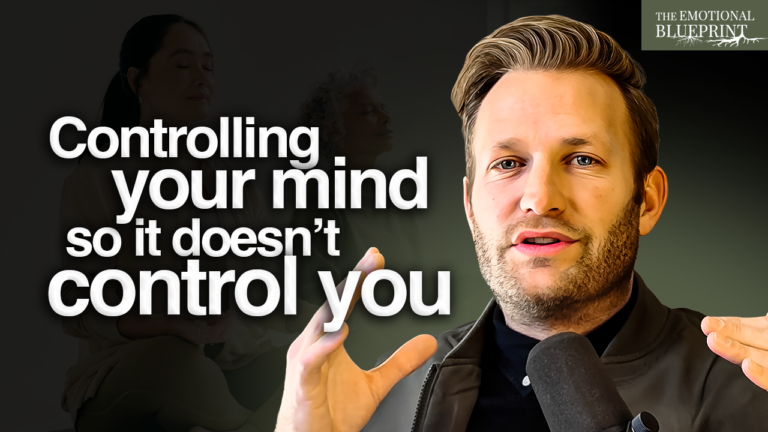One of the most common questions people ask is, How do I start feeling better emotionally? The answer begins with understanding that the quality of our relationships with others is deeply connected to our relationship with ourselves. But what does that actually mean?
Watch or Listen On Your Favorite Streaming Service
Think about how you build a relationship with someone else: you spend time with them, ask meaningful questions, and seek to understand them. The same principles apply when cultivating a deeper connection with yourself. A passage from the Bible states: “In returning and rest, you shall be saved; in quietness and confidence shall be your strength.” This highlights the importance of self-reflection, stillness, and self-awareness.
Steps to Strengthen Your Relationship with Yourself
- Practice Stillness: Take time each day to sit in silence and avoid overthinking. This grounding practice allows you to connect with your inner self.
- Ask Yourself the Right Questions: Just as you would ask deep questions to someone you care about, do the same for yourself:
- What emotions have been coming up for me lately?
- What do these emotions mean?
- What do I need right now?
- Balance Awareness and Action: Our true self consists of both masculine and feminine energy. The feminine aspect is awareness—recognizing what you feel. The masculine aspect is doing—taking action to fulfill your needs.
- Overcome Codependency: If you rely on others to fulfill your emotional needs, this creates strain on relationships. Learning to recognize and meet your own needs fosters emotional independence.
Understanding and Releasing Past Pain
An African proverb states: “If there is no enemy within, the enemy outside can do us no harm.” This means that unresolved thoughts and past pain hold us back more than external circumstances. Awareness of past wounds is a start, but true healing comes from taking intentional action to release them.
A powerful example comes from a woman struggling with approval addiction. She recognized that her pattern stemmed from a lack of validation from her father. Even though she was aware of this, it wasn’t enough to break the cycle. True healing required actively working through the pain, rather than just understanding it intellectually.
Managing Your Thoughts Effectively
Many of us struggle with intrusive thoughts that interrupt our daily lives. Avoiding these thoughts only gives them more power. Instead, try this practice:
- Acknowledge the Thought: Imagine thoughts knocking on your door. Rather than ignoring them, answer the door and say, “I see you, but now is not a good time. Let’s talk later.”
- Schedule Time to Revisit the Thought: Set aside a specific time (e.g., 7 PM) to reflect on recurring thoughts or emotions.
- Follow Through on Your Commitment: If you don’t keep the appointment, your mind will begin to distrust the process, making intrusive thoughts more persistent.
The Key to Meaningful Change: Humility
True transformation begins with humility—the willingness to ask, What am I responsible for, and what can I do to make this better? A profound story illustrates this: A woman who lost her newborn in a tragic car accident felt deep anger toward the man responsible. However, after learning about his painful past, her anger began to dissolve. Her willingness to seek understanding allowed her to let go of the resentment that could have consumed her life.
Humility and a student mindset invite transformation. As the saying goes, “When the student is ready, the teacher will appear.” Healing requires sacrifice—letting go of old patterns to make room for something greater. While the rewards are not immediate, the long-term benefits far outweigh the temporary discomfort of self-work.
Self-Worth: From Knowing to Experiencing
Many people say, “I’m doing everything right, but I still don’t feel confident or worthy.” This is because self-worth isn’t just about knowing intellectually (K-N-O-W), but about experiencing it emotionally (G-N-O-S-I-S). If unresolved pain is blocking your ability to feel worthy, true confidence will remain out of reach.
Healing past wounds, especially those connected to our parents, is crucial. Once we release this pain, we naturally return to our baseline state of contentment and self-assurance.
Balancing Vanity and Self-Worth
Vanity is increasingly prevalent in our culture. Ask yourself:
- Does my appearance cause me anxiety?
- Does it interfere with my relationships?
While caring for your physical body is important, an overemphasis on appearance often stems from a lack of internal worth. When we don’t feel enough inside, we seek validation outside—through looks, possessions, or status. This can become an addiction, never providing lasting fulfillment. True confidence comes from within, not from external approval.
Final Thoughts
Self-awareness, emotional processing, and intentional action are the keys to inner peace. Healing takes time and sacrifice, but the reward is a profound sense of strength, confidence, and emotional freedom.
Stay committed to the journey, and remember—when you truly understand and care for yourself, your relationships and overall well-being will naturally transform.
